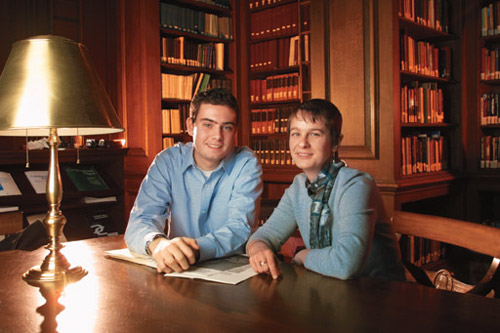Marquis Scholar Benton Wilmoth ’05 (Marysville, Ohio) has been corresponding with Eastern European government officials and plans on taking a trip to United Nations headquarters in New York during his exploration of changing domestic violence legislation in post-Communist Europe.
Wilmoth is working as an EXCEL Scholar with Katalin Fabian, assistant professor of government and law. In EXCEL, students collaborate with faculty on research while earning a stipend.
“I am convinced that no other college in the nation can provide their undergraduates with comparable access to professors for the research opportunities that I am experiencing at Lafayette,” he says. “Lafayette’s small size, in combination with outstanding professors and immense resources, make it the perfect atmosphere for one-on-one contact with faculty. When I speak with my friends from high school who chose larger schools — even some of the Ivies — they are amazed by the opportunities I’m afforded at Lafayette, experiences only available to their schools’ graduate students.”
Fabian has shared her research through numerous articles, book chapters, and conference proceedings. Last year, she published articles in European Journal of Women’s Studies, Hungarian Studies Review 2002, and a Collegium Budapest-Institute for Advanced Study web site; wrote book reviews published by Canadian-American Slavic Review and Voluntas; and presented papers at Congress of the Social Sciences and Humanities, University of Toronto, and a conference held by International Studies Association, New Orleans. She has received many honors, awards, and prizes, including grants from the Ford Foundation, the Institute for the Study of World Politics, the Lyndon B. Johnson School of Public Affairs, and the Institute for International Peace Studies.
Wilmoth is studying the economic, political, and social changes of Eastern Europe since the fall of Communism and how those changes have affected women. In particular, he is focusing on the modifications made in domestic violence legislation.
“Domestic violence legislation existed in a different framework under the Communist system,” says Fabian. “Ben and I are researching and evaluating how the situation has changed in the new post-Communist regimes of Poland, the Czech Republic, Slovakia, Hungary, and Slovenia.”
Wilmoth and Fabian are gathering information from the scholarly work on the growing women’s activist network, policy changes, and legislation adopted under the new government. They are noticing a growing influence of non-governmental organizations (NGOs).
“The fall of Communism has provided a democratic framework that easily lends itself to the influence of NGOs and lobbyists who represent women’s interests and place pressure on governments to uphold their human rights commitments,” says Wilmoth, a double major in government & law and International Affairs. “Our research focuses on the roles such NGOs have played in influencing, if not initiating, bills which recognize and outlaw domestic violence.”
For Wilmoth, who is considering graduate or law school, this EXCEL work has broadened his knowledge of the spectrum of legal and human rights from country to country. He is also struck by the evolving role of women in these eastern countries and the continuing struggle many women face.
“As these countries struggle to shed their traditional views of women’s roles in society and adopt values and ultimately laws which adhere to internationally recognized standards of human rights, they have met with limited success,” he says.
Finding a lack of scholarship in the area, Wilmoth has concentrated on primary sources of information.
“In order to form our profiles, we make every attempt to gather our material directly from the individuals and organizations who are making changes in these countries,” he explains. “I have been in contact with numerous members of the Polish Senate, government officials from Slovenia’s Office for Women’s Policy, judges from Slovakia, and innumerable members of lobbying groups and NGOs advocating domestic violence legislation reform.”
In addition, Wilmoth and Fabian have tapped sources at the United Nation’s Division for the Advancement of Women. “Professor Fabian and I are making plans to travel to the United Nations headquarters in New York to further our research with specific sources and documents prepared by U.N. officials,” he says.
“Professor Fabian pushes me to think critically, forcing me not simply to report but to interpret, driving me to present my research in a cohesive comparative context that looks beyond data and single facts towards the conclusions and impacts that are ultimately more valuable to our goals as investigators,” he says. “Professor Fabian’s high standards and expectations of my intellectual contribution to the research truly make the EXCEL program a practical extension of the classroom.”
President of College Republicans, Wilmoth is active in the Republican Party in Easton and a member of the Mock Trial team and German Club. He is also a volunteer tutor for Shawnee Success Academy, an after-school mentoring program for seventh and eighth grade students.

Marquis Scholar Benton Wilmoth ’05 researched changing legislation on domestic violence in post-Communist Europe as an EXCEL Scholar working with Katalin Fabian, assistant professor of government and law.
